The Trump administration found itself in the awkward position Monday of demanding that Iran comply with a nuclear accord that the president has derided as the worst deal in history.
Iran announced Monday it would break a limit on uranium stockpiles established by a 2015 agreement with world powers that was intended to restrict the Islamic Republic's nuclear program in exchange for an easing of international sanctions.
President Donald Trump withdrew from the agreement, signed by his predecessor, and reinstated punishing economic sanctions, resulting in sharply rising tensions that deteriorated further with Iran's warning that it could soon start to enrich uranium to just a step away from weapons-grade levels.
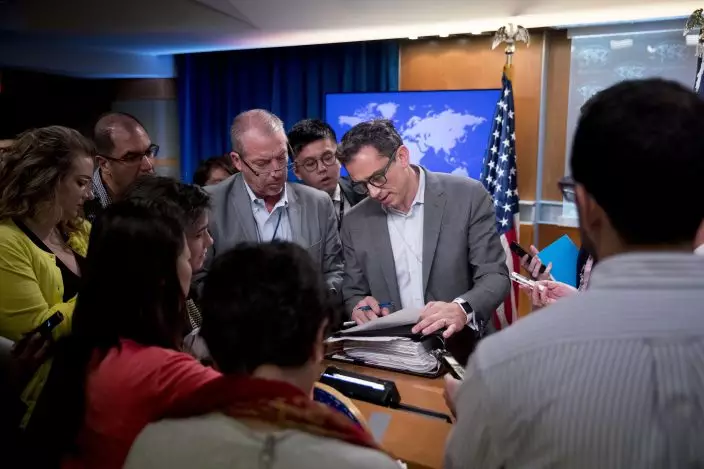
Deputy Spokesperson Robert Palladino speaks with reporters following a news conference at the State Department in Washington, Monday, June 17, 2019. (AP PhotoAndrew Harnik)
That put the State Department in the position of defending the limits set by the 2015 deal that was so maligned by Trump and his national security team.
"We continue to call on the Iranian regime not to obtain a nuclear weapon, to abide by their commitments to the international community," State Department spokeswoman Morgan Ortagus told reporters.
The Iranian announcement seemed likely to further inflame Mideast tensions as the U.S. was working with allies on a response to attacks on two oil tankers near the Persian Gulf that Secretary of State Mike Pompeo said was carried out by Iranian forces. The Pentagon released new photos intended to bolster its case that Iran was responsible for the attacks.
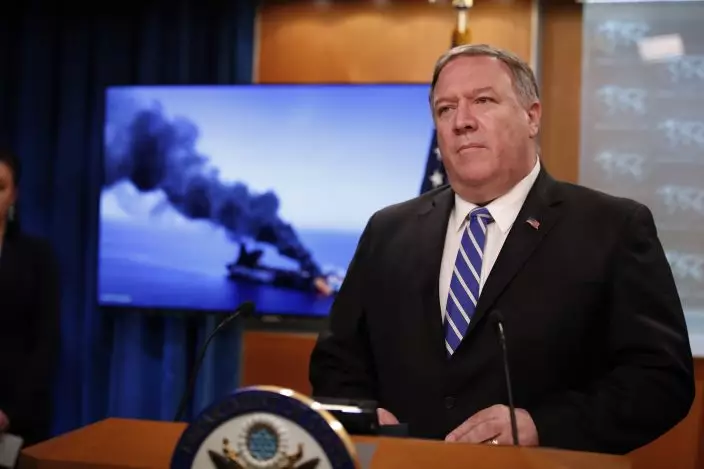
Secretary of State Mike Pompeo speaks during a media availability at the State Department, Thursday, June 13, 2019, in Washington. (AP PhotoAlex Brandon)
The State Department spokeswoman said Iran's uranium announcement amounted to "extortion" and a "challenge to international norms," as well as to the 2015 agreement known formally as the Joint Comprehensive Plan of Action.
"It's unfortunate that they have made this announcement today," Ortagus said. "It doesn't surprise anybody and this is why the president has often said that the JCPOA needs to be replaced with a better deal."
Trump appeared to say the deal should not be violated in a tweet that said "Iran to defy Uranium Stockpile Limits."
Supporters of the deal, meanwhile, blamed the Trump administration for Iran's provocative announcements, saying they were entirely predictable given the renewed U.S. pressure.
"While Iran's frustration with Trump's reckless and irresponsible pressure campaign is understandable, we strongly urge Iran to remain in compliance with the nuclear deal," the Arms Control Association said in a statement. "It remains in Iran's interests to abide by the limits of the agreement and to fully cooperate with the International Atomic Energy Agency's more intrusive monitoring and verification."
Iran has shown no willingness to negotiate another deal and vowed not enter into talks with the United States while the administration maintains its "maximum pressure" campaign of sanctions.
Administration officials found themselves Monday grappling with whether to press the remaining parties to the deal, including Britain, France and Germany, to demand that Iran stay in compliance. They must also consider if such a stance would essentially concede that the restrictions imposed during the Obama administration, while short of ideal, are better than none.
Under the deal, Iran can keep a stockpile of no more than 660 pounds (300 kilograms) of low-enriched uranium. Behrouz Kamalvandi, spokesman for Iran's atomic agency, said it would pass that limit June 27.
A senior U.S. official said the administration is most concerned about any violation of the deal that would reduce the breakout time that Iran would need to produce a nuclear weapon. The deal aimed to keep the breakout time at one year.
The official said certain violations, while they should be not accepted, would not necessarily reduce that time. But other violations, such as enriching uranium to 20%, should be addressed immediately if they occur, the official said. The official was not authorized to discuss the matter publicly and spoke on condition of anonymity.
The official said it would be up to the Europeans to decide if Iran was in violation of the deal and whether to initiate a dispute resolution mechanism that could bring the Iranians back into compliance. Pompeo is expected to meet this week with E.U. foreign policy chief Federica Mogherini, a leading deal proponent, at which this issue is likely to be raised.
Pompeo, who was a leading critic of the deal while he was in Congress, has said in the past that Iranian compliance is not really an issue as the administration sees the agreement as fundamentally flawed because over time it eases many limits on Iran's nuclear activities.
Yet, just last week, the U.S. ambassador to the U.N.'s nuclear watchdog accused Iran of violating a provision of the deal that relates to advanced centrifuges and called on the Europeans to ensure that Iran remains in compliance.
VENICE, Italy (AP) — Under the gaze of the world’s media, the fragile lagoon city of Venice launches a pilot program Thursday to charge day-trippers a 5-euro (around $5.35) entry fee that authorities hope will discourage visitors from arriving on peak days and make the city more livable for its dwindling residents.
Signs advising arriving visitors of the new requirement for a test phase of 29 days through July have been erected outside the main train station and other points of arrival.
Some 200 stewards have been trained to politely walk anyone unaware of the fee through the process of downloading a QR code. A kiosk has been set up for those not equipped with a smartphone. Once past designated entry ports, officials will carry out random checks for QR codes that show the day-tripper tax has been paid or that the bearer is exempt.
Transgressors face fines 50 euros to 300 euros. The requirement applies only for people arriving between 8:30 a.m. and 4 p.m. Outside of those hours, access is free.
“We need to find a new balance between the tourists and residents,’’ said the city’s top tourism official, Simone Venturini. “We need to safeguard the spaces of the residents, of course, and we need to discourage the arrival of day-trippers on some particular days.”
Venice has long suffered under the pressure of over-tourism, but officials say that pre-pandemic estimates ranging from 25 million to 30 million visitors a year — including day-trippers — are not reliable and that the pilot project also aims to come up with more exact figures to help better manage the phenomenon.
By contrast, registered visitors spending the night last year numbered 4.6 million, according to city figures, down 16% from pre-pandemic highs.
Venturini said the city is strained when the number of day-trippers reaches 30,000 to 40,000. Its narrow alleyways are clogged with people and water taxis packed, making it difficult for residents to go about their business.
Not all residents, however, are persuaded of the efficacy of the new system in dissuading mass tourism, and say more attention needs to be paid to boosting the resident population and services they need.
Venice last year passed a telling milestone when the number of tourist beds exceeded for the first time the number of official residents, which is now below 50,000 in the historic center with its picturesque canals.
“Putting a ticket to enter a city will not decrease not even by one single unit the number of visitors that are coming,’’ said Tommaso Cacciari, an activist who organized a protest Thursday against the measure.
“You pay a ticket to take the metro, to go to a museum, an amusement park; you don’t pay a ticket to enter a city. This is the last symbolic step of a project of an idea of this municipal administration to kick residents out of Venice,” he said.
Venturini said about 6,000 people had already paid to download the QR code, and officials expect paid day-tripper arrivals Thursday to reach some 10,000.
More than 70,000 others have downloaded a QR code denoting an exemption, including to work in Venice or as a resident of the Veneto region. People staying in hotels in Venice, including in mainland districts like Marghera or Mestre, should also get a QR code attesting to their stay, which includes a hotel tax.
The tourist official says interest in Venice's pilot program has been keen from other places suffering from mass tourism, including other Italian art cities and cities abroad such as Barcelona and Amsterdam.
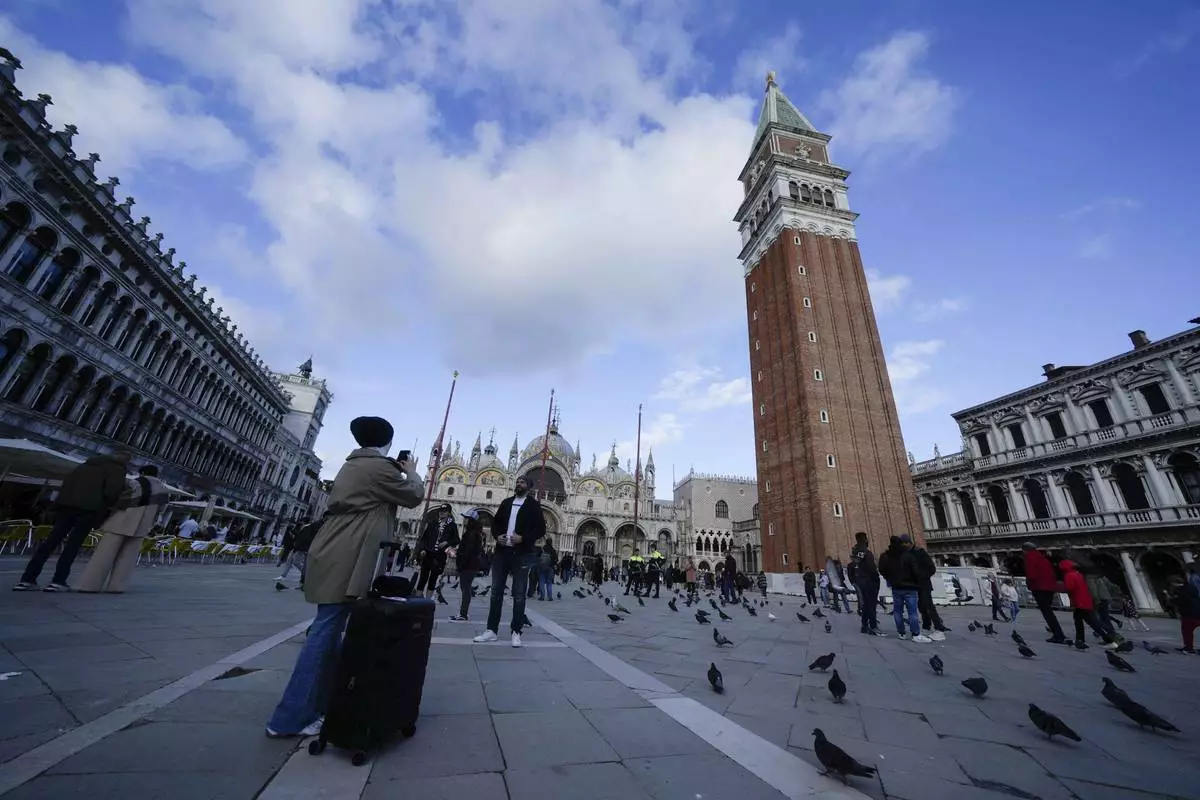
Tourists take pictures at the St. Mark square in Venice, Italy, Wednesday, April 24, 2024. The lagoon city of Venice begins a pilot program Thursday, April 25, 2024 to charge daytrippers a 5 euro entry fee that authorities hope will discourage tourists from arriving on peak days. Officials expect some 10,000 people will pay the fee to access the city on the first day, downloading a QR code to prove their payment. (AP Photo/Luca Bruno)
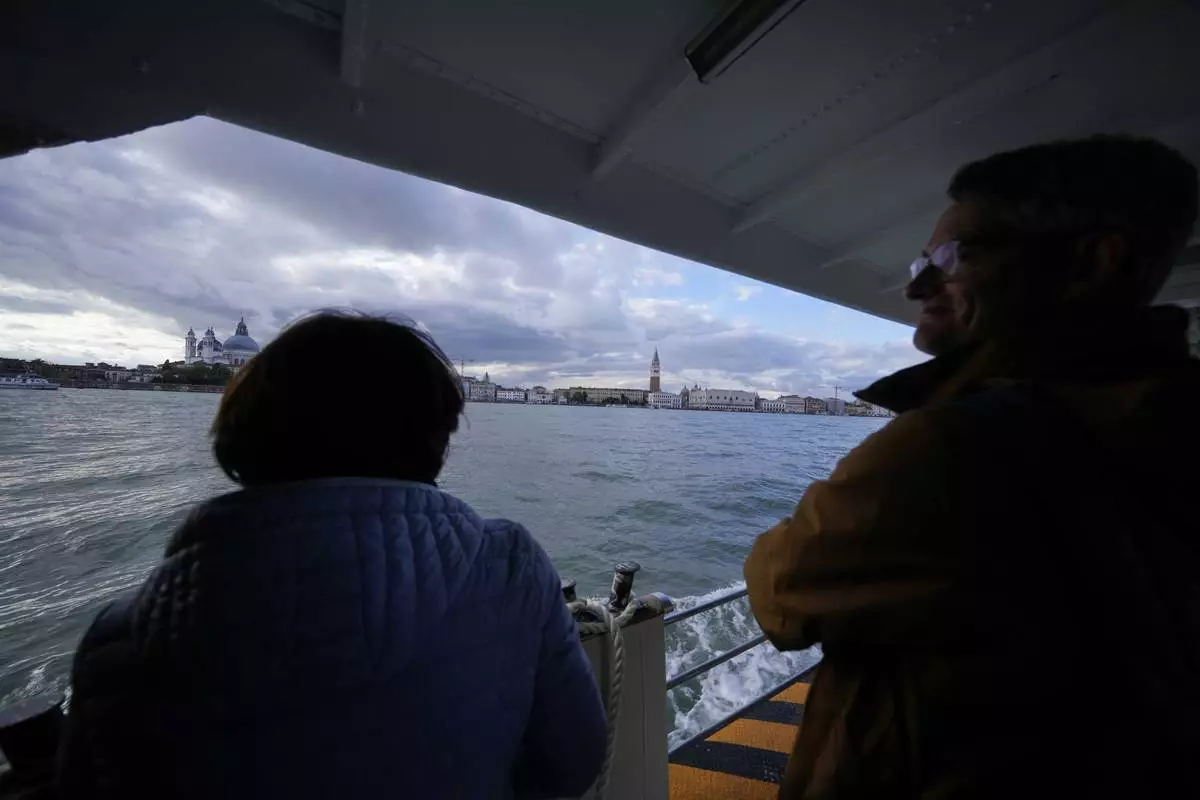
Tourists ride on a ferry boat in Venice, Italy, Wednesday, April 24, 2024. The lagoon city of Venice begins a pilot program Thursday, April 25, 2024 to charge daytrippers a 5 euro entry fee that authorities hope will discourage tourists from arriving on peak days. Officials expect some 10,000 people will pay the fee to access the city on the first day, downloading a QR code to prove their payment. (AP Photo/Luca Bruno)
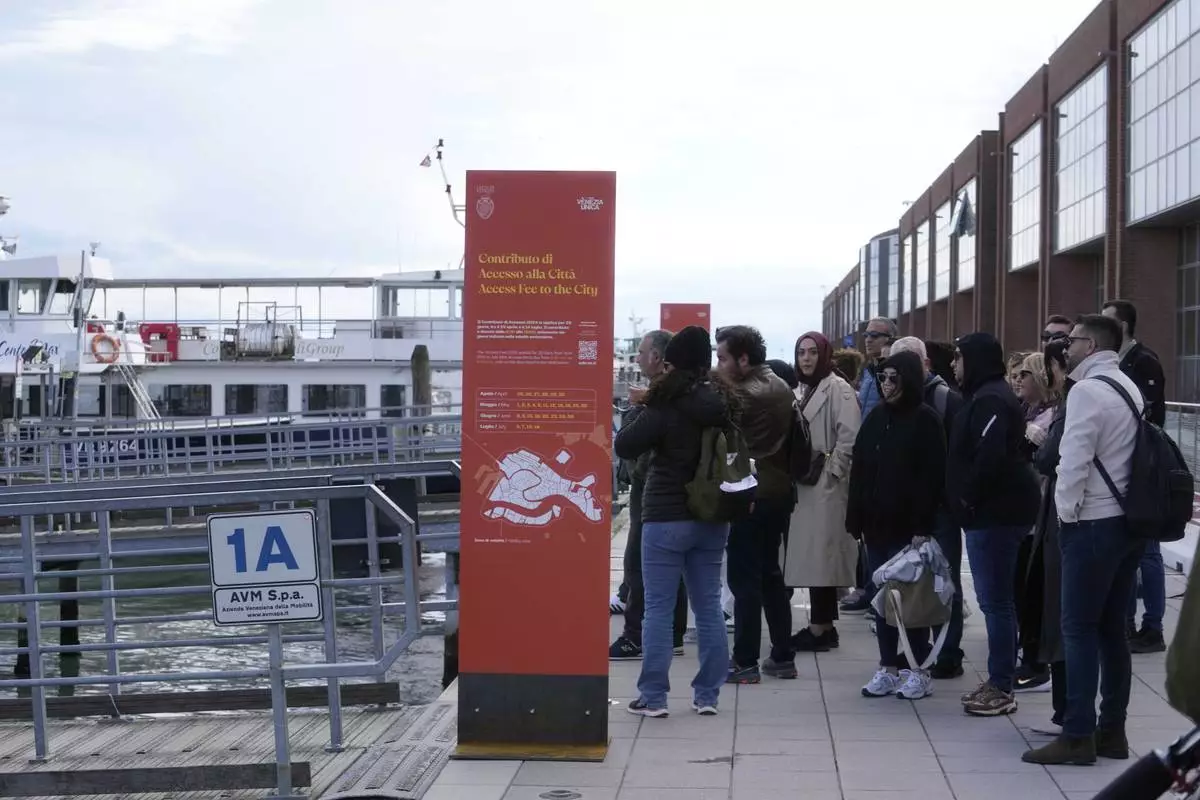
People stand in front of an information board explaining how to pay the tourist tax in Venice, Italy, Wednesday, April 24, 2024. The lagoon city of Venice begins a pilot program Thursday, April 25, 2024 to charge daytrippers a 5 euro entry fee that authorities hope will discourage tourists from arriving on peak days. Officials expect some 10,000 people will pay the fee to access the city on the first day, downloading a QR code to prove their payment. (AP Photo/Luca Bruno)
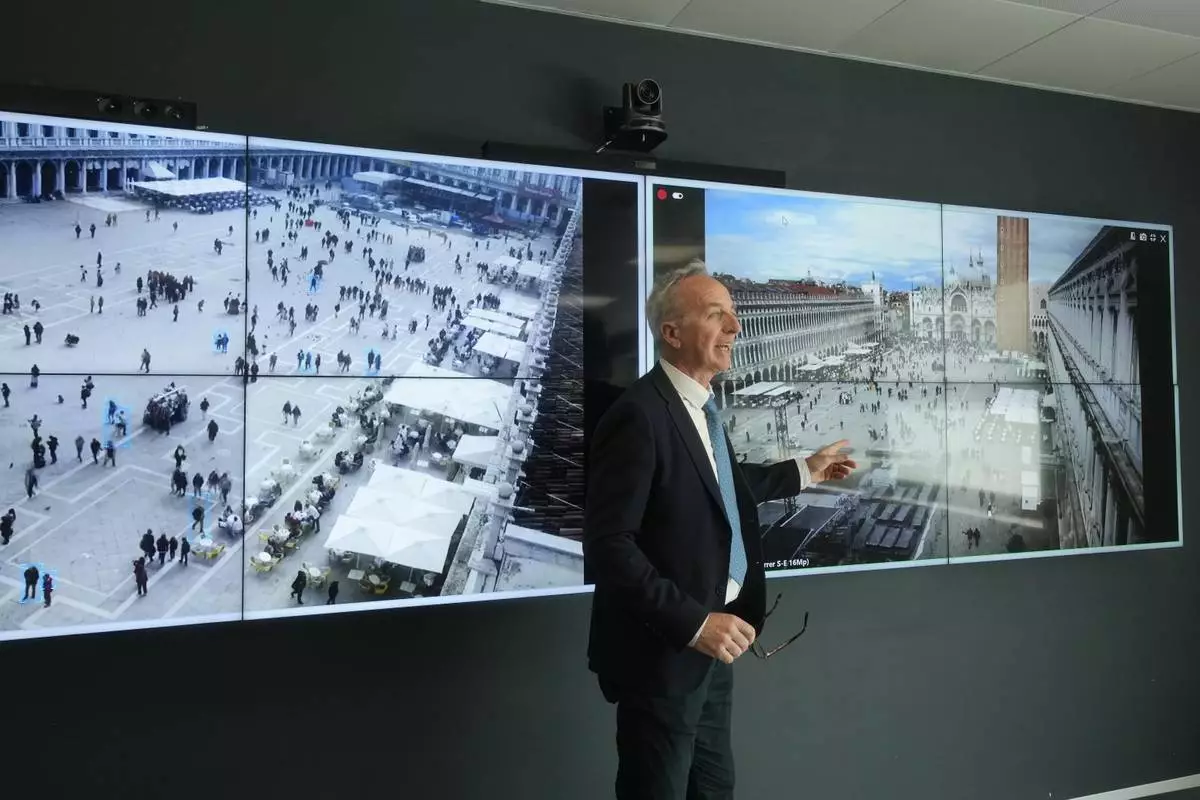
Marco Bettini, director of Venis Informatics System, gestures as he talks to reporters at the police Venice control room, in Venice, Italy, Wednesday, April 24, 2024. The lagoon city of Venice begins a pilot program Thursday, April 25, 2024 to charge daytrippers a 5 euro entry fee that authorities hope will discourage tourists from arriving on peak days. Officials expect some 10,000 people will pay the fee to access the city on the first day, downloading a QR code to prove their payment. (AP Photo/Luca Bruno)
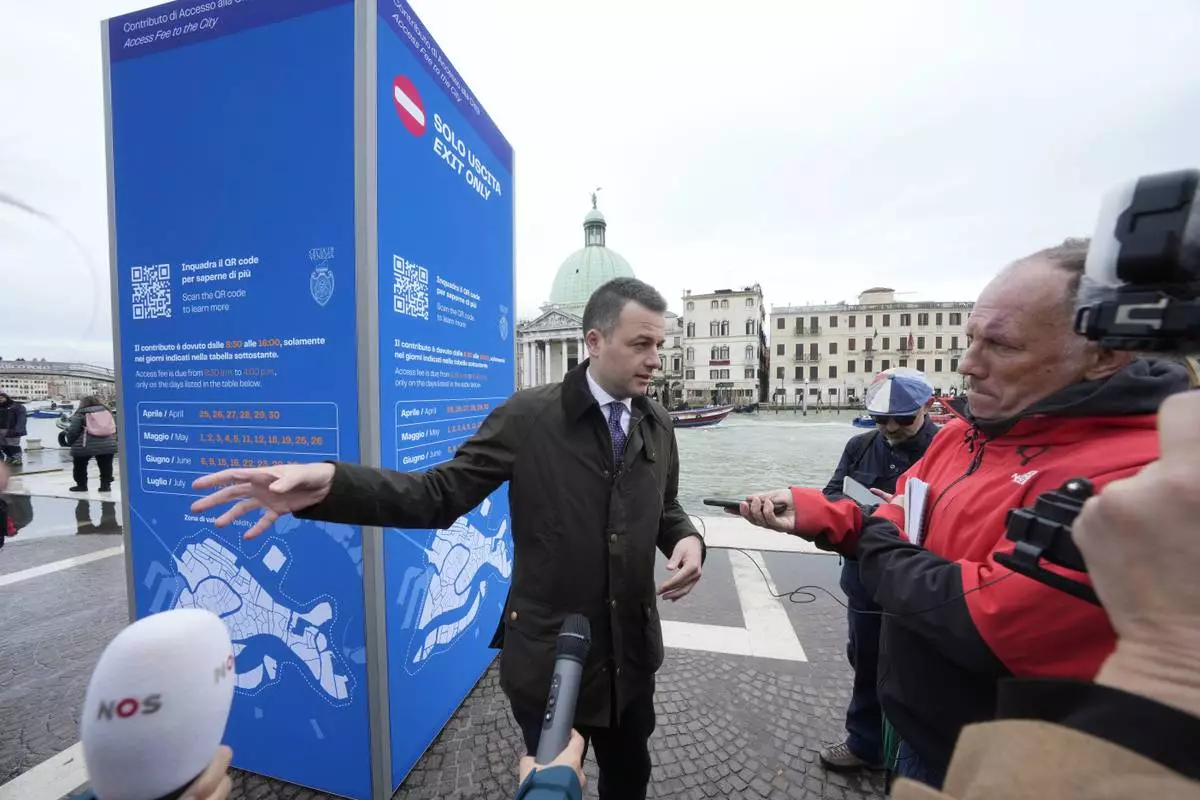
Venice councillor Simone Venturini speaks with reporters in front of a tourist tax totem in Venice, Italy, Wednesday, April 24, 2024. The lagoon city of Venice begins a pilot program Thursday, April 25, 2024 to charge daytrippers a 5 euro entry fee that authorities hope will discourage tourists from arriving on peak days. Officials expect some 10,000 people will pay the fee to access the city on the first day, downloading a QR code to prove their payment. (AP Photo/Luca Bruno)
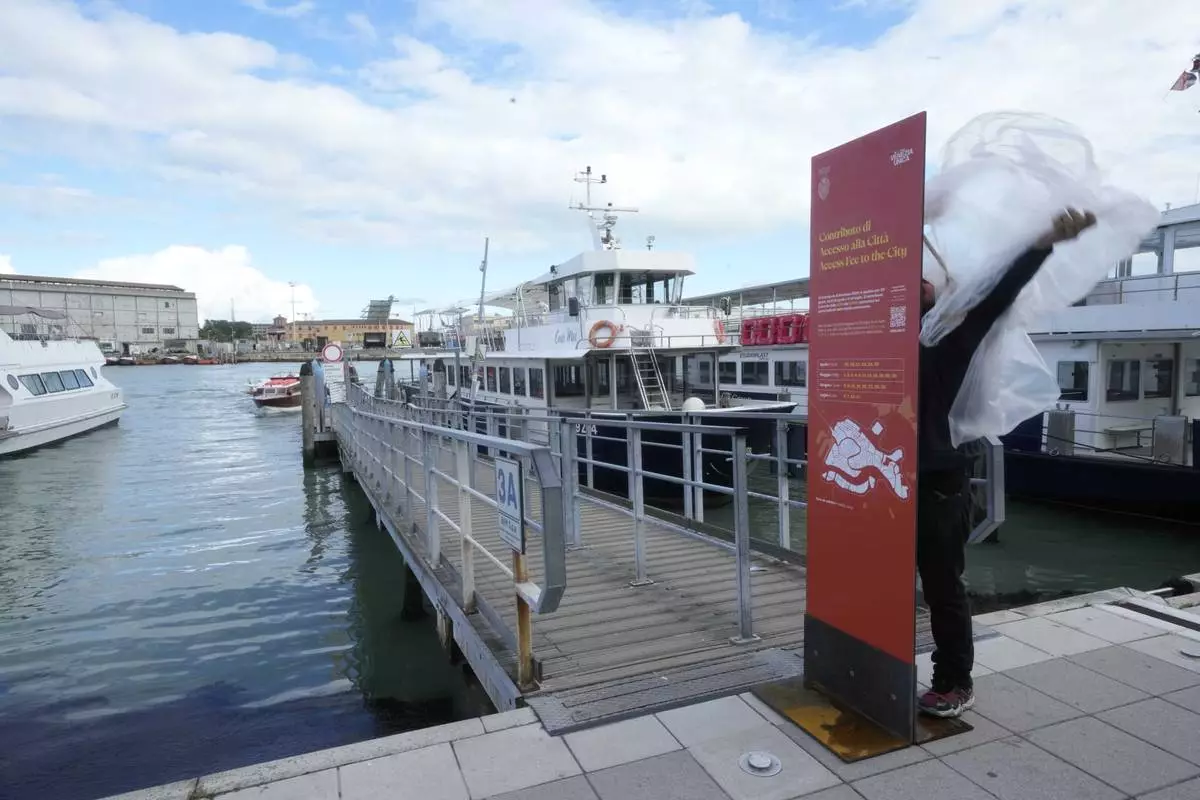
Workers prepare banner explaining how to pay the tourist tax in Venice, Italy, Wednesday, April 24, 2024. The lagoon city of Venice begins a pilot program Thursday, April 25, 2024 to charge daytrippers a 5 euro entry fee that authorities hope will discourage tourists from arriving on peak days. Officials expect some 10,000 people will pay the fee to access the city on the first day, downloading a QR code to prove their payment. (AP Photo/Luca Bruno)
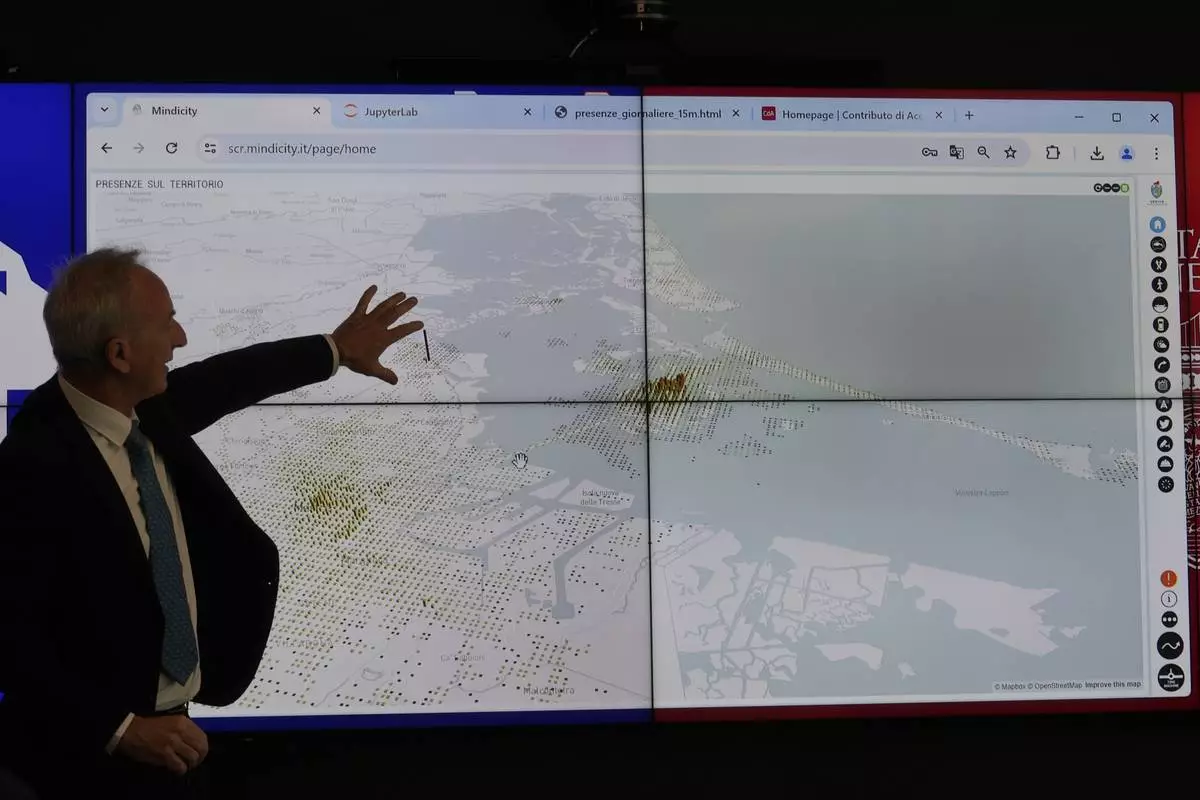
Marco Bettini, director of Venis Informatics System, gestures as he explains the Venice density to reporters at the police Venice control room in Venice, Italy, Wednesday, April 24, 2024. The lagoon city of Venice begins a pilot program Thursday, April 25, 2024 to charge daytrippers a 5 euro entry fee that authorities hope will discourage tourists from arriving on peak days. Officials expect some 10,000 people will pay the fee to access the city on the first day, downloading a QR code to prove their payment. (AP Photo/Luca Bruno)
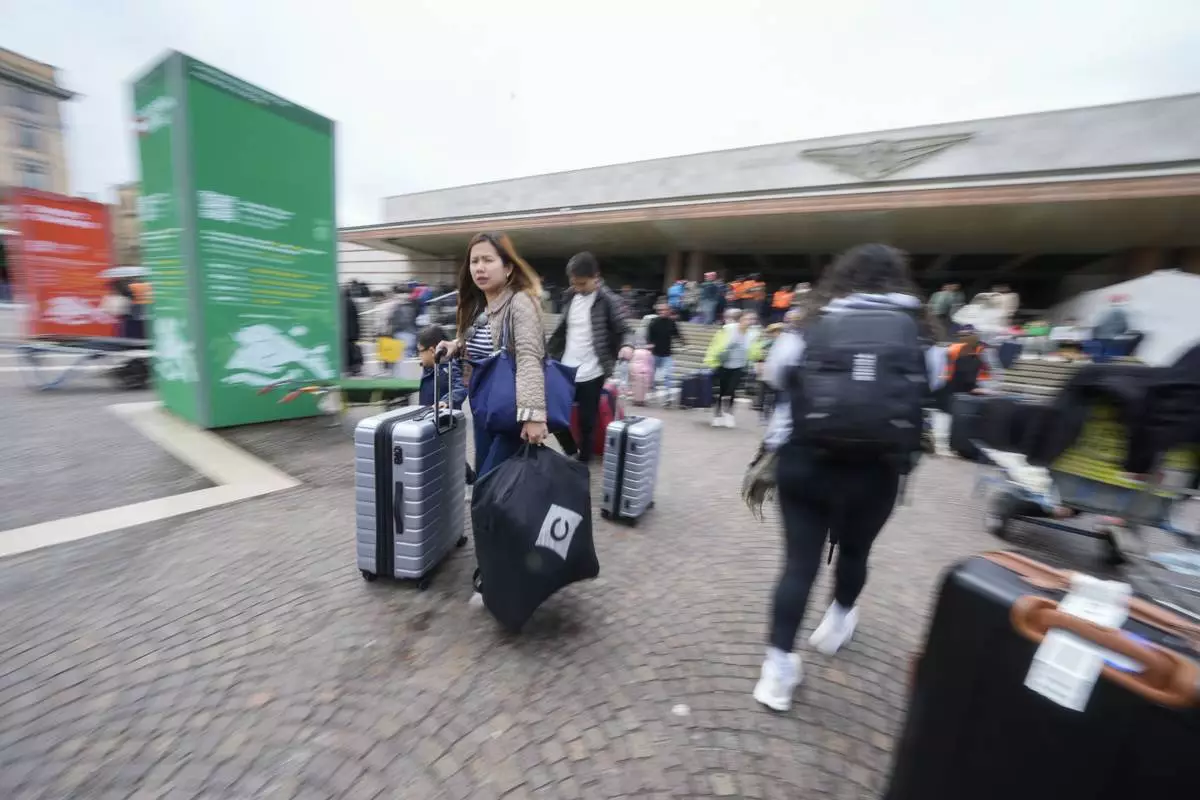
Tourists arrive at the main train station in Venice, Italy, Wednesday, April 24, 2024. The lagoon city of Venice begins a pilot program Thursday, April 25, 2024 to charge daytrippers a 5 euro entry fee that authorities hope will discourage tourists from arriving on peak days. Officials expect some 10,000 people will pay the fee to access the city on the first day, downloading a QR code to prove their payment. (AP Photo/Luca Bruno)
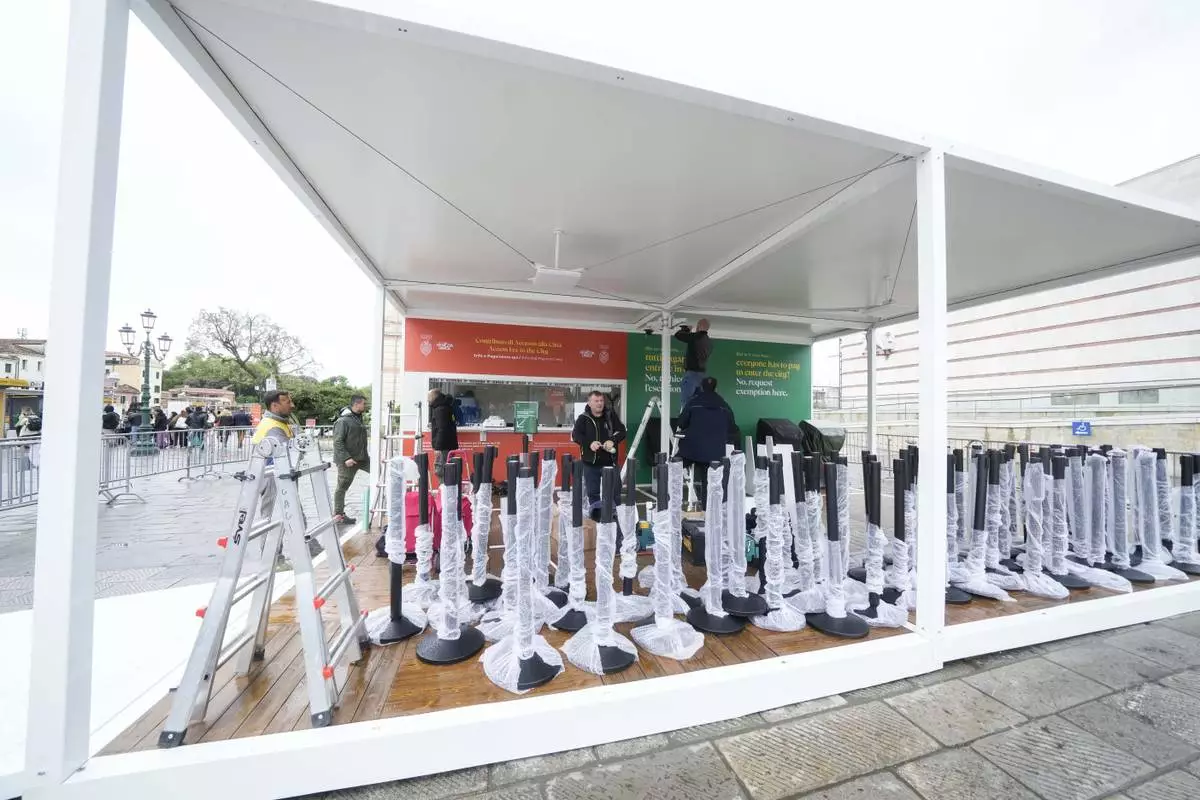
Workers prepare the tourist tax cashier desks outside the main train station in Venice, Italy, Wednesday, April 24, 2024. The lagoon city of Venice begins a pilot program Thursday, April 25, 2024 to charge daytrippers a 5 euro entry fee that authorities hope will discourage tourists from arriving on peak days. Officials expect some 10,000 people will pay the fee to access the city on the first day, downloading a QR code to prove their payment. (AP Photo/Luca Bruno)
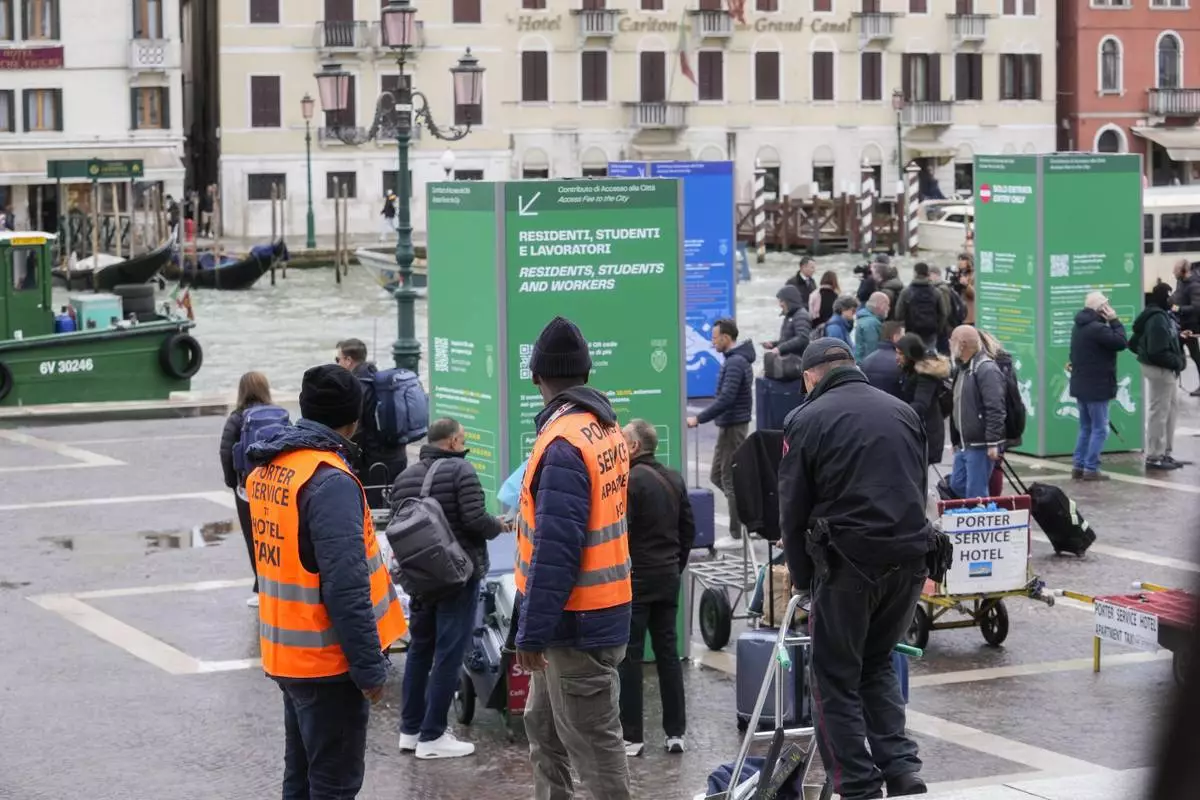
Porters wait for tourists outside the main train station in Venice, Italy, Wednesday, April 24, 2024. The lagoon city of Venice begins a pilot program Thursday, April 25, 2024 to charge daytrippers a 5 euro entry fee that authorities hope will discourage tourists from arriving on peak days. Officials expect some 10,000 people will pay the fee to access the city on the first day, downloading a QR code to prove their payment. (AP Photo/Luca Bruno)
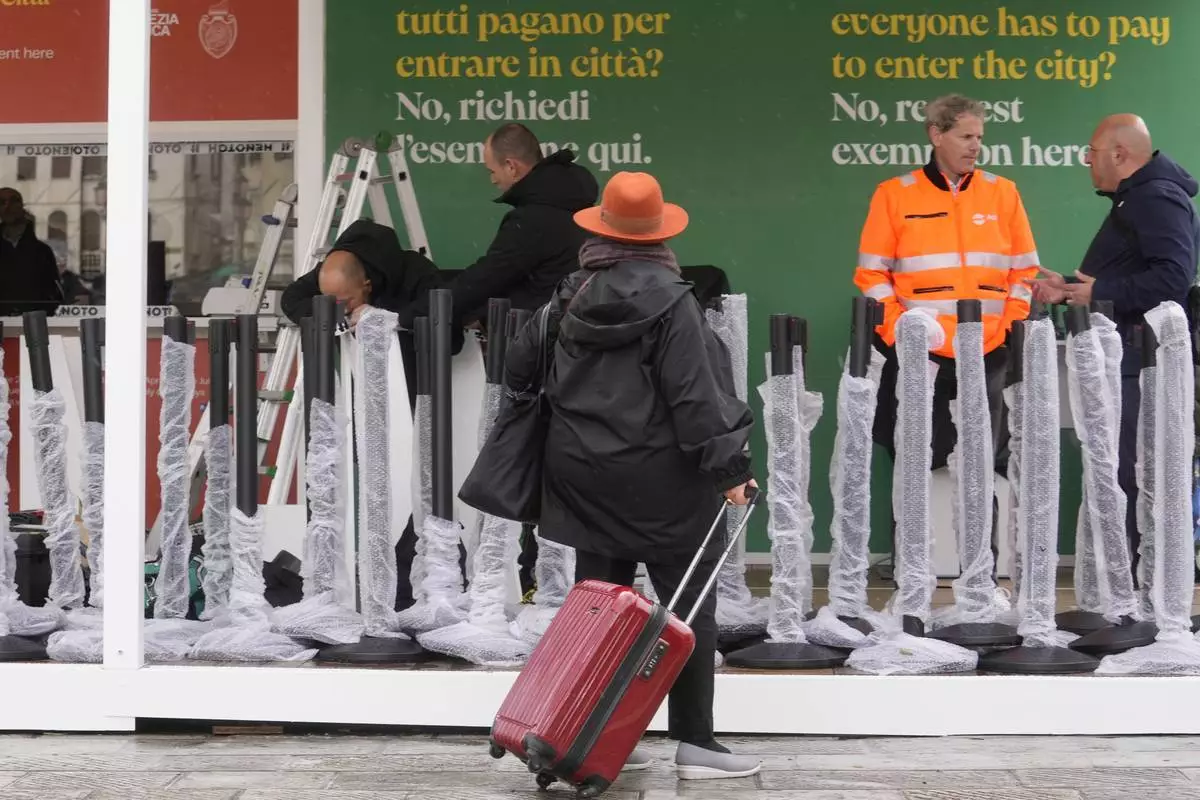
Workers prepare the tourist tax cashier desks outside the main train station in Venice, Italy, Wednesday, April 24, 2024. The lagoon city of Venice begins a pilot program Thursday, April 25, 2024 to charge daytrippers a 5 euro entry fee that authorities hope will discourage tourists from arriving on peak days. Officials expect some 10,000 people will pay the fee to access the city on the first day, downloading a QR code to prove their payment. (AP Photo/Luca Bruno)
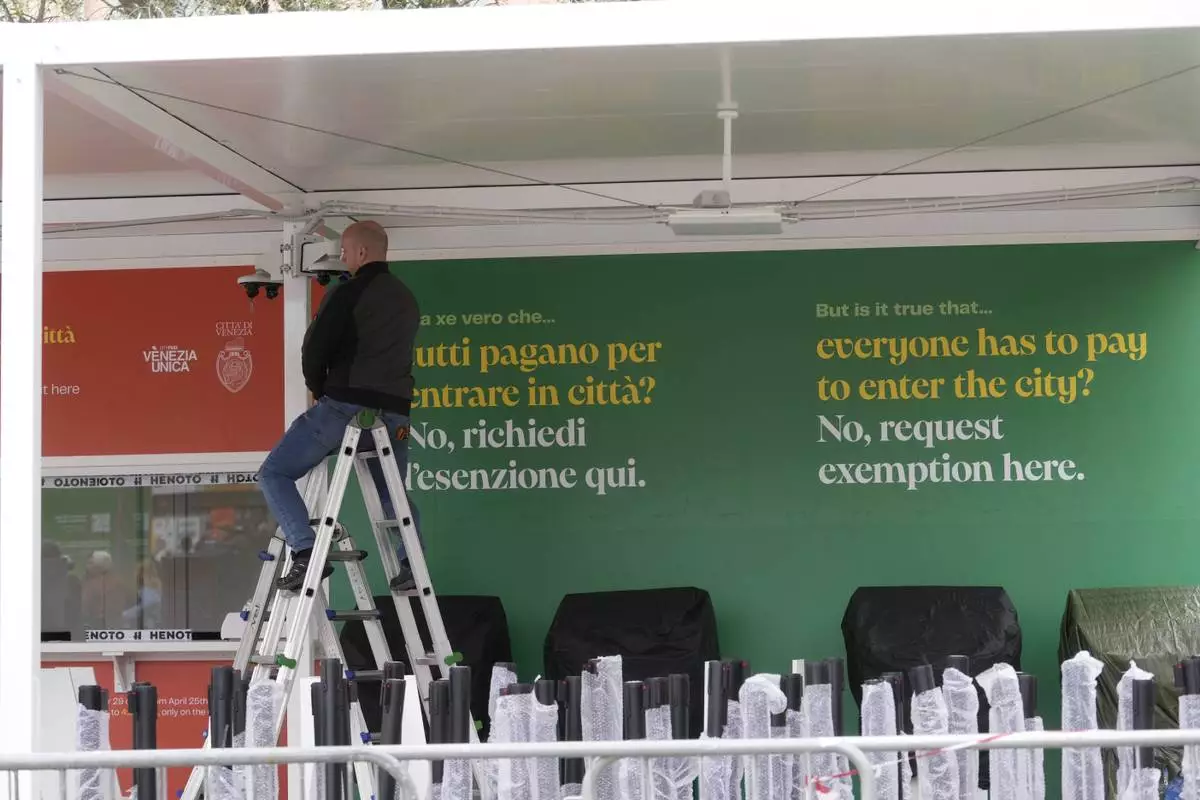
Workers prepare the tourist tax cashier desks outside the main train station in Venice, Italy, Wednesday, April 24, 2024. The lagoon city of Venice begins a pilot program Thursday, April 25, 2024 to charge daytrippers a 5 euro entry fee that authorities hope will discourage tourists from arriving on peak days. Officials expect some 10,000 people will pay the fee to access the city on the first day, downloading a QR code to prove their payment. (AP Photo/Luca Bruno)
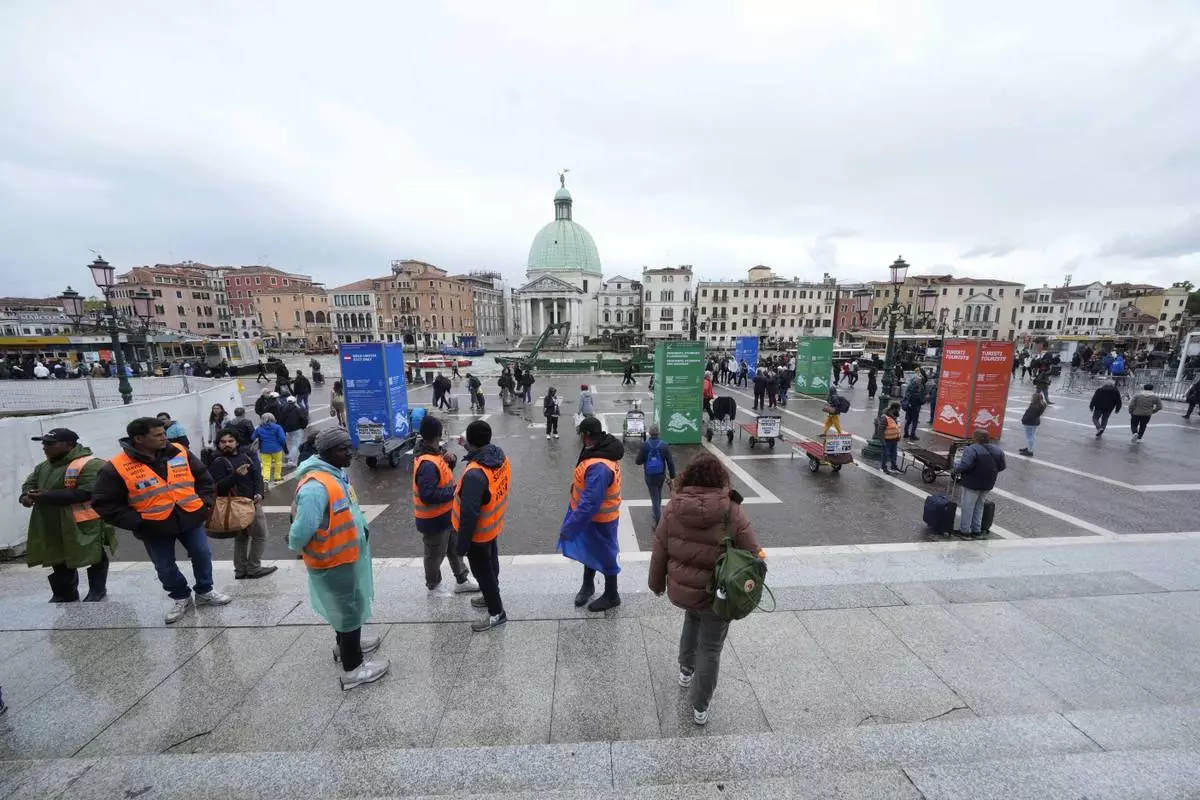
Porters wait for tourists outside the main train station in Venice, Italy, Wednesday, April 24, 2024. The lagoon city of Venice begins a pilot program Thursday, April 25, 2024 to charge daytrippers a 5 euro entry fee that authorities hope will discourage tourists from arriving on peak days. Officials expect some 10,000 people will pay the fee to access the city on the first day, downloading a QR code to prove their payment. (AP Photo/Luca Bruno)
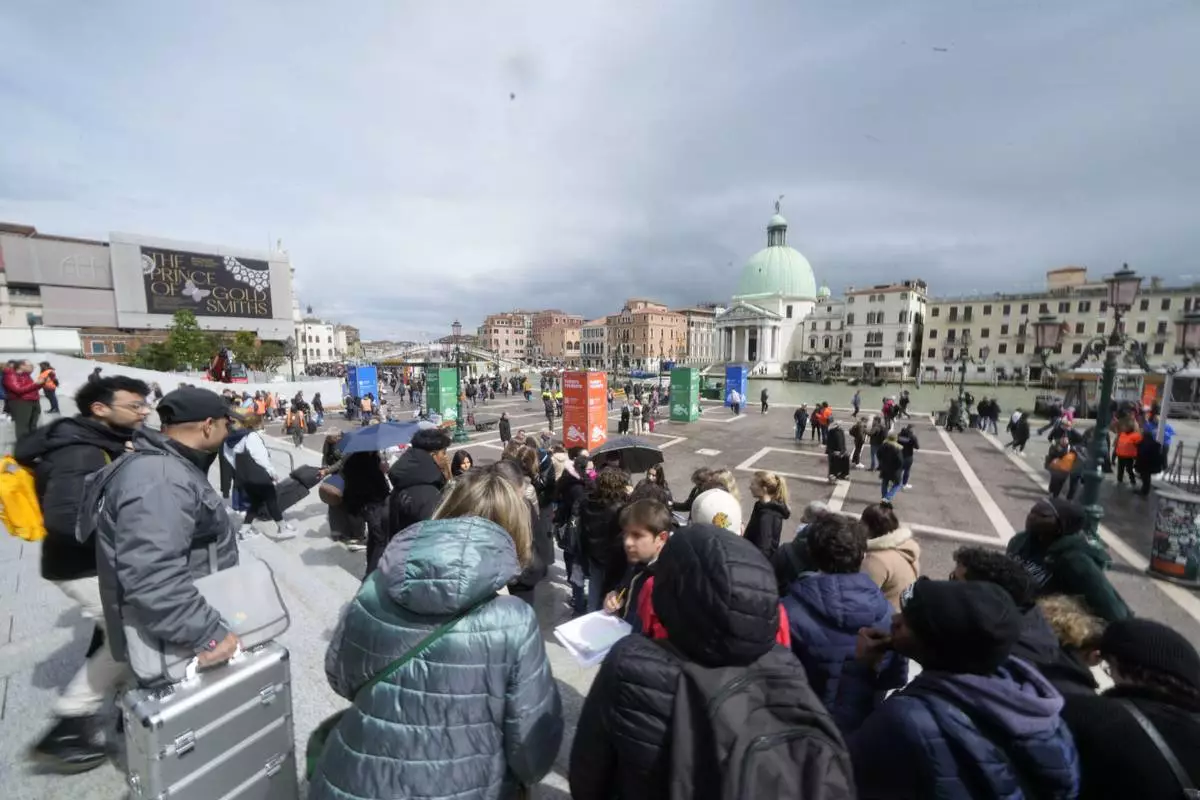
Tourists arrive outside the main train station in Venice, Italy, Wednesday, April 24, 2024. The lagoon city of Venice begins a pilot program Thursday, April 25, 2024 to charge daytrippers a 5 euro entry fee that authorities hope will discourage tourists from arriving on peak days. Officials expect some 10,000 people will pay the fee to access the city on the first day, downloading a QR code to prove their payment. (AP Photo/Luca Bruno)
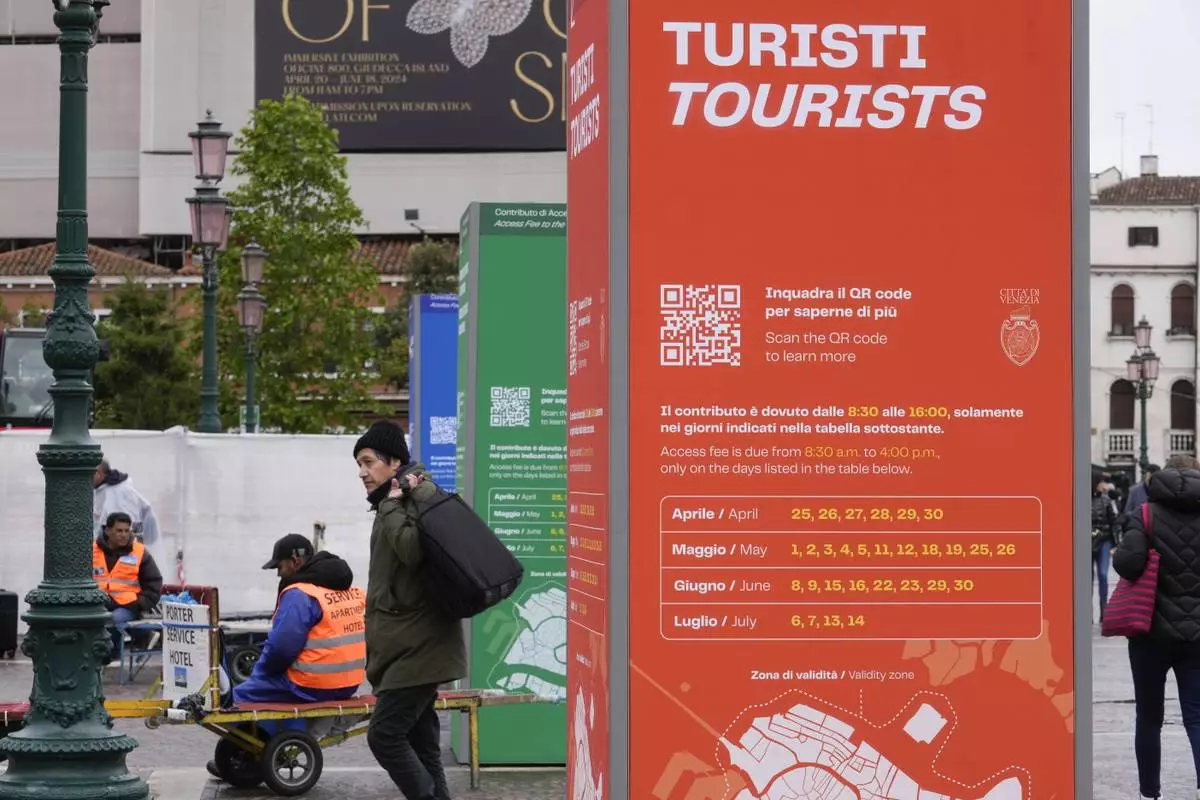
Tourist information boards are seen outside the main train station in Venice, Italy, Wednesday, April 24, 2024. The lagoon city of Venice begins a pilot program Thursday, April 25, 2024 to charge daytrippers a 5 euro entry fee that authorities hope will discourage tourists from arriving on peak days. Officials expect some 10,000 people will pay the fee to access the city on the first day, downloading a QR code to prove their payment. (AP Photo/Luca Bruno)
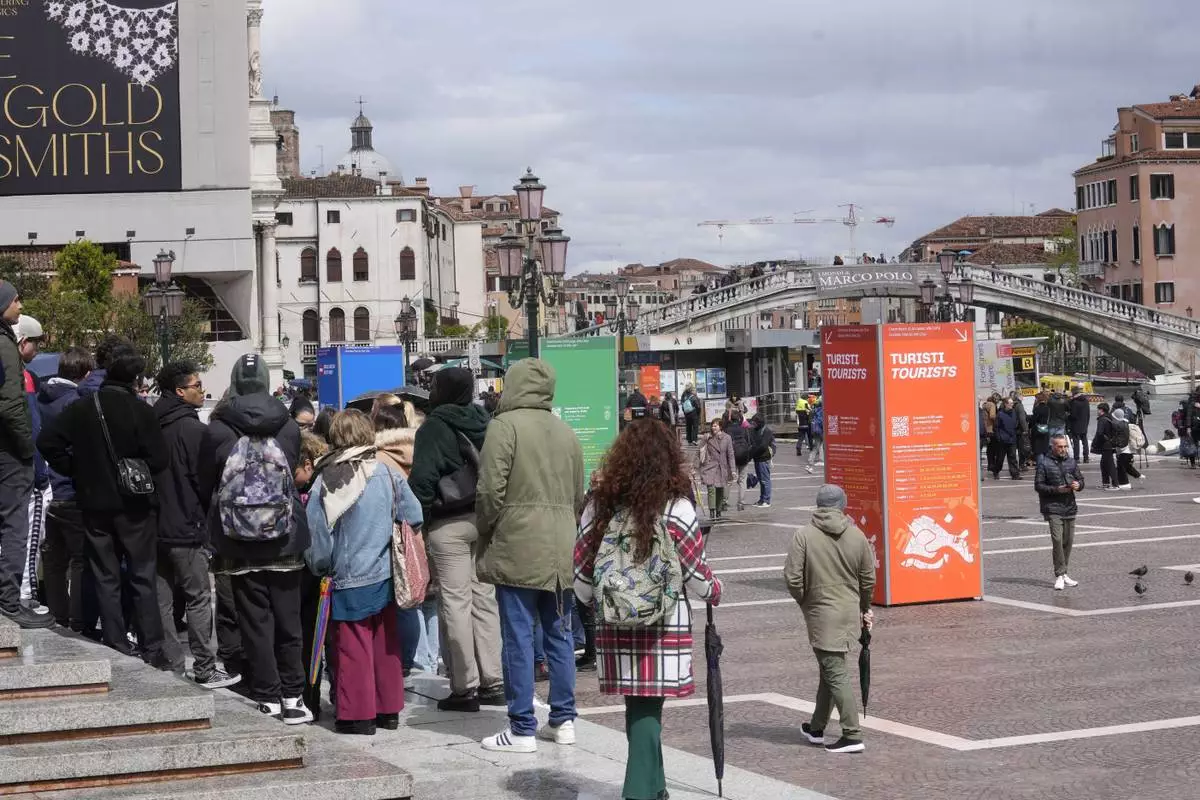
Tourists arrive outside the main train station in Venice, Italy, Wednesday, April 24, 2024. The lagoon city of Venice begins a pilot program Thursday, April 25, 2024 to charge daytrippers a 5 euro entry fee that authorities hope will discourage tourists from arriving on peak days. Officials expect some 10,000 people will pay the fee to access the city on the first day, downloading a QR code to prove their payment. (AP Photo/Luca Bruno)



























